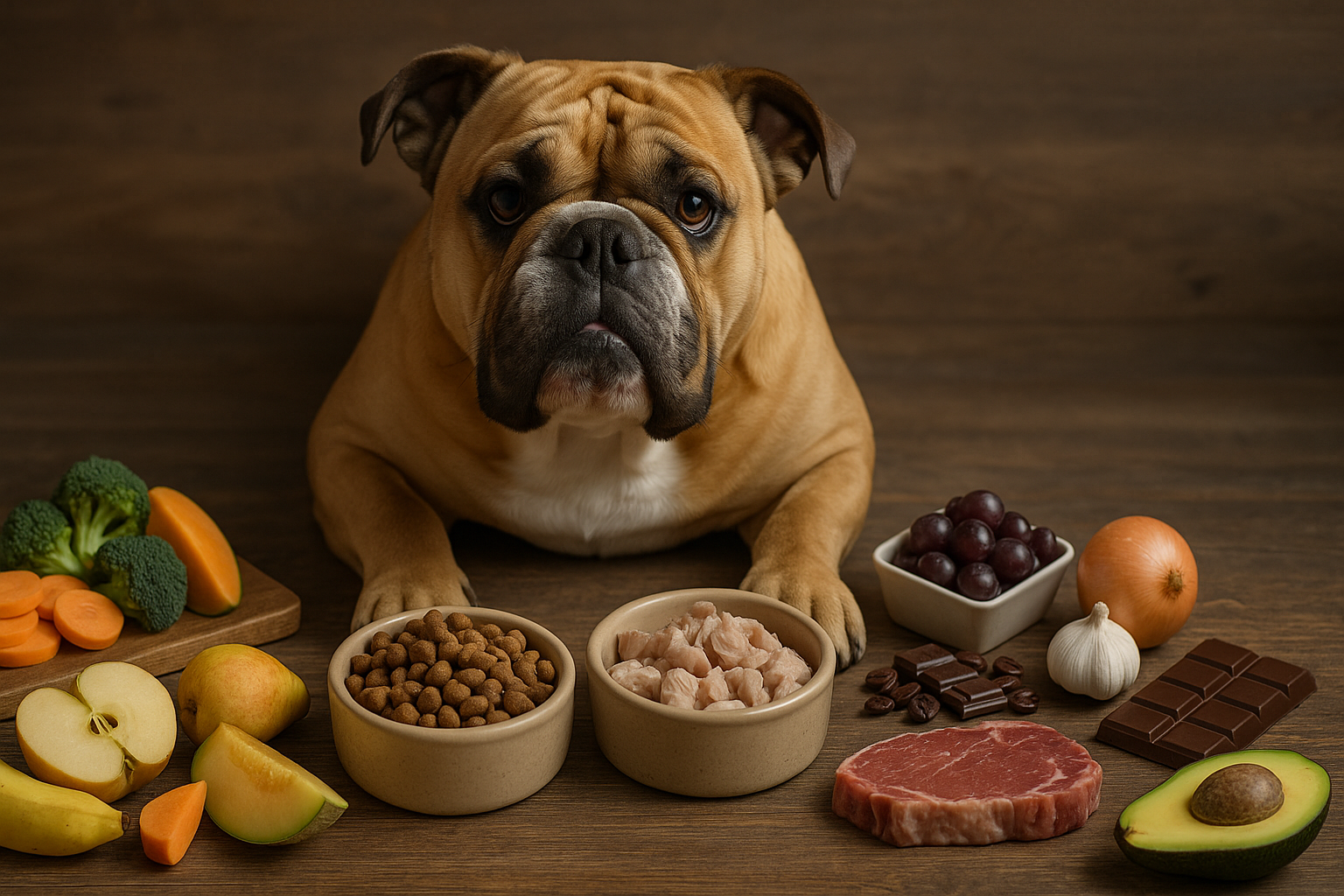Proper nutrition is one of the fundamental pillars to ensure a long and healthy life for your Bulldog. This adorable and sturdy breed, with its charming personality, has a sensitive digestive system and is more prone to problems such as obesity, food allergies, and intestinal disorders. That’s why knowing exactly what your Bulldog can and cannot eat is essential for taking good care of their health and avoiding unnecessary issues.
Understanding the Ideal Bulldog Diet
Bulldogs need a balanced diet rich in high-quality protein, healthy fats, complex carbohydrates, and fiber. Their food must also provide vitamins, minerals, and antioxidants to strengthen the immune system and maintain overall health.
You can choose different types of feeding, as long as they are safe and nutritionally balanced:
- High-quality dry food, specifically formulated for medium-sized breeds
- Natural or BARF diet (with guidance from a specialized veterinarian)
- Balanced homemade meals, always with professional supervision
Avoid sudden changes in your Bulldog’s diet, as this can cause digestive problems. Whenever you need to switch food types, do it gradually, mixing the new food with the old one for at least seven days.
Recommended Foods for Bulldogs
There are several foods that are safe and beneficial for Bulldogs. These can be included in their main diet or offered occasionally as treats. Here are some good options:
Cooked lean meats such as chicken, turkey, beef, or lamb are excellent protein sources. They should be well-cooked, without seasoning, salt, or bones, which can be harmful.
Cooked fish such as salmon and sardines are great sources of omega-3, important for the health of the skin, coat, and joints. Always serve cooked and boneless.
Rice and oats are easy to digest and help stabilize the digestive system. They’re ideal when your dog has mild stomach issues.
Cooked vegetables such as carrots, pumpkin, and broccoli provide fiber, vitamins, and antioxidants. Pumpkin also helps regulate bowel movements.
Fruits in moderation are also welcome. Apples without seeds, pears, bananas, and melon are safe options, but should be given in small amounts due to their natural sugar content.
Cooked eggs are safe and provide protein and healthy fats. Raw eggs should be avoided as they may cause digestive imbalances.
Olive oil or salmon oil, added in small amounts to food, help with digestion and coat health.
Plain unsweetened yogurt, in small portions, can support gut health, especially after a course of antibiotics.
Always cut foods into small pieces to prevent choking and serve in controlled portions to avoid unbalancing the main diet.
Foods Bulldogs Should Avoid
Some foods that may seem harmless to humans can be dangerous or even fatal to dogs, especially Bulldogs, who are more sensitive:
Chocolate is highly toxic due to the presence of theobromine. Even small amounts can cause vomiting, diarrhea, seizures, and even death.
Grapes and raisins, although safe for humans, can cause acute kidney failure in dogs. The exact reason is still unknown, but the danger is real.
Onions and garlic, whether raw or cooked, contain substances that destroy red blood cells and can lead to severe anemia.
Alcohol and caffeine are extremely toxic and affect the central nervous system, potentially causing tremors, vomiting, rapid heartbeat, or even coma.
Whole milk and ice cream are not recommended, as most Bulldogs are lactose intolerant, leading to digestive upset like diarrhea or vomiting.
Cooked bones, even large ones, can splinter and cause internal injuries or intestinal blockage.
Avocado, macadamia nuts, and foods containing xylitol (a common sweetener in sugar-free products) are highly toxic and should be completely avoided.
Fatty or fried meats can trigger pancreatitis, a painful and dangerous inflammation of the pancreas.
Human leftovers and junk food are loaded with salt, fats, spices, and additives, and they also promote bad eating habits in your pet.
Can Bulldogs Eat Dry or Wet Food?
Yes, as long as it’s high-quality and appropriate for their needs. Dry food helps keep teeth clean and is often more economical, while wet food can be ideal for dogs with chewing difficulties or picky appetites.
It’s also possible to combine both types, but you need to calculate the total calorie intake to avoid overfeeding. The food should match your Bulldog’s age (puppy, adult, or senior), weight, and activity level.
Avoid products with vague meat by-products, artificial colors, and excess grains, as these have lower nutritional value.
What Treats Are Suitable?
Treats are a great way to reward your Bulldog and reinforce good behavior, but they should be given in moderation. Here are some safe options:
Small pieces of apple or carrot are refreshing, crunchy, and healthy.
Dog biscuits without sugar, coloring, or artificial preservatives are good for daily treats.
Natural dehydrated meat snacks are practical and highly palatable.
Small portions of low-salt cheese can be used as occasional rewards, as long as your Bulldog isn’t lactose intolerant.
The golden rule is that treats should make up no more than 10% of your dog’s daily calorie intake. This helps maintain a healthy weight and nutritional balance.
Feeding Frequency and Portion Sizes
Adult Bulldogs should be fed twice a day with balanced portions. Splitting meals helps prevent issues like gastric torsion and keeps energy levels steady. Puppies require more frequent feedings—three to four times per day—with smaller portions tailored to their age and size.
Always consult a veterinarian to determine the ideal amount of food and adjust based on your dog’s weight and activity level. Using a scale or measuring cup is highly recommended to avoid guesswork.
Taking Care of Their Diet Is Taking Care of Their Health
Knowing what your Bulldog can and cannot eat is one of the most important steps in ensuring their long-term health and happiness. A well-balanced diet prevents diseases, improves overall well-being, and strengthens the bond between you and your dog. With attention and care, you can offer a safe, enjoyable, and nutritious eating routine for your beloved companion.
